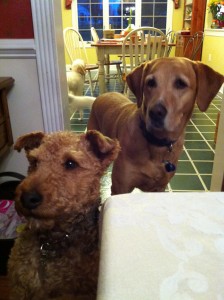 This article appeared on petMD as part of Dr Mahaney’s The Daily Vet series.
There are many things to be thankful for this holiday season, with our health and that of our pets topping the list. Thanksgiving is my favorite holiday (Christmas is too commercial and I'm a practicing agnostic), as I get together with family, run a 10K “turkey trot” to raise money for MS (personal donation page: Join the Movement), and motivate myself to complete (some of) my 2011 goals before the year's end.
As with Halloween (see Dr. Patrick’s Top Holistic Halloween Pet Safety Tips on petMD), Thanksgiving continues the trend of human holidays that create pet health hazards, including festive foods, decorations, and schedule and environment changes. Take the following precautions to reduce the likelihood that you will suffer emotional and financial stress caused by your pet’s holiday health crisis.
Holiday Foods
Although their tastes are appealing, avoid feeding your pet any of the following jolly goodies:
Chocolate and sweets — Chocolate contains chemical compounds called methylzanthines (caffeine and theobromine), which have dangerous stimulating effects for dogs, including hyperexcitability, elevated heart rate/blood pressure, and seizures. Darker chocolate having a higher percentage of cocoa is more toxic in smaller amounts than lighter milk chocolate. White chocolate and non-chocolate sweets are stimulant-free, but can cause serious gastrointestinal abnormalities (vomiting, diarrhea, and pancreatitis) due their high sugar and/or fat content.
Fats and Proteins — Holiday foods, including animal skin, meats, and cheese are dense in calories, fat, and protein. Feeding your pet an amount of these foods that seems small for a person can exceed your pet’s daily caloric requirements. Additionally, the interruption of your dog’s consistent consumption of a particular food can lead to gastrointestinal upset.
Bones — Cooked bones are prone to splintering, which mechanically irritates the lining of the stomach and intestines. If ingested, large or multiple pieces of bones can potentially cause esophageal, gastric, or intestinal obstruction. Please don't let your pets share in the wishbone breaking tradition, as their portion will likely be consumed.
Dried Fruits — Raisins (and grapes) have an unknown toxic mechanism that damages the canine kidney. The toxic effects can be seen when non-specific amounts are ingested, so prevent your dog from eating any raisins and grapes. Additionally, as store bought dried fruits may contain preservatives (sulfites, etc.) or other illness causing contaminants, skip sharing Grandma's special fruitcake with Fido.
Holiday Decorations
This article appeared on petMD as part of Dr Mahaney’s The Daily Vet series.
There are many things to be thankful for this holiday season, with our health and that of our pets topping the list. Thanksgiving is my favorite holiday (Christmas is too commercial and I'm a practicing agnostic), as I get together with family, run a 10K “turkey trot” to raise money for MS (personal donation page: Join the Movement), and motivate myself to complete (some of) my 2011 goals before the year's end.
As with Halloween (see Dr. Patrick’s Top Holistic Halloween Pet Safety Tips on petMD), Thanksgiving continues the trend of human holidays that create pet health hazards, including festive foods, decorations, and schedule and environment changes. Take the following precautions to reduce the likelihood that you will suffer emotional and financial stress caused by your pet’s holiday health crisis.
Holiday Foods
Although their tastes are appealing, avoid feeding your pet any of the following jolly goodies:
Chocolate and sweets — Chocolate contains chemical compounds called methylzanthines (caffeine and theobromine), which have dangerous stimulating effects for dogs, including hyperexcitability, elevated heart rate/blood pressure, and seizures. Darker chocolate having a higher percentage of cocoa is more toxic in smaller amounts than lighter milk chocolate. White chocolate and non-chocolate sweets are stimulant-free, but can cause serious gastrointestinal abnormalities (vomiting, diarrhea, and pancreatitis) due their high sugar and/or fat content.
Fats and Proteins — Holiday foods, including animal skin, meats, and cheese are dense in calories, fat, and protein. Feeding your pet an amount of these foods that seems small for a person can exceed your pet’s daily caloric requirements. Additionally, the interruption of your dog’s consistent consumption of a particular food can lead to gastrointestinal upset.
Bones — Cooked bones are prone to splintering, which mechanically irritates the lining of the stomach and intestines. If ingested, large or multiple pieces of bones can potentially cause esophageal, gastric, or intestinal obstruction. Please don't let your pets share in the wishbone breaking tradition, as their portion will likely be consumed.
Dried Fruits — Raisins (and grapes) have an unknown toxic mechanism that damages the canine kidney. The toxic effects can be seen when non-specific amounts are ingested, so prevent your dog from eating any raisins and grapes. Additionally, as store bought dried fruits may contain preservatives (sulfites, etc.) or other illness causing contaminants, skip sharing Grandma's special fruitcake with Fido.
Holiday Decorations
 Holiday decorations, including candles and plants, add a festive touch to your home, but can cause life threatening dangers for both pets and people.
Candles — Even momentary contact with a lit candle can set your pet’s fur ablaze, leading to severe skin burns. In my veterinary practice, I've witnessed the horrific nature of third degree burns, as with Buddha, my canine patient who was singed by an unknown heat source (see Burned French Bulldog Continues to Heal with Acupuncture Treatments). Your entire family may be at risk if a pet knocks over a candle which then ignites flammable household materials.
Additionally, scented candles (cinnamon, fig, vanilla, etc.) emit appealing aromas and may cause gastrointestinal abnormalities if consumed.
Provide intriguing play toys to keep your pet's attention away from holiday decorations. Additionally, confine pets to a safe space lacking access to tempting treats and objects unless a responsible human supervisor is present.
Schedule and Environmental Changes
Holidays create situational changes in people's lives and cause additional stress for our pets. The frequent arrivals and departures of pet owners or guests increase the likelihood your animal companion could go missing. Even if your pet is not a notorious escape artist, fit your pet with an appropriate collar bearing up to date identification. Additionally, microchip implantation can increase the likelihood that you and your pet will reunite should a collar fall off or be removed.
Travel plans or the presence of holiday guests may require a pet to be kenneled in a facility or confined in a portion of your home. Tiring out your pet by partaking in energetically draining activity will reduce the likelihood that confinement will cause an anxious episode. If your pet is kept outdoors, provide a comfortable, climate controlled shelter from weather extremes.
This holiday season, plan for the possibility that your chosen festivities can cause problems for your pet. Don’t be "that owner" berating yourself after a pet has gotten sick from consuming festive foods or has been traumatized through an unsupervised interaction with holiday decor.
Should your pet show illness or is suspected to have inappropriately consumed holiday foods or decor, immediately contact your veterinarian or emergency veterinary hospital. Have a fun and safe Thanksgiving.
Thank you for reading my article. To receive my next article via email, sign up by following this link.
Please feel free to communicate with me through Twitter (@PatrickMahaney) and follow my adventures in veterinary medicine by friending Patrick Mahaney: Veterinarian Acupuncture Pain Management for Your Pets on Facebook.
Copyright of this article (2011) is owned by Dr. Patrick Mahaney, Veterinarian and Certified Veterinary Acupuncturist. Republishing any portion of this article must first be authorized by Dr. Patrick Mahaney. Requests for republishing must be approved by Dr. Patrick Mahaney and received in written format.
Holiday decorations, including candles and plants, add a festive touch to your home, but can cause life threatening dangers for both pets and people.
Candles — Even momentary contact with a lit candle can set your pet’s fur ablaze, leading to severe skin burns. In my veterinary practice, I've witnessed the horrific nature of third degree burns, as with Buddha, my canine patient who was singed by an unknown heat source (see Burned French Bulldog Continues to Heal with Acupuncture Treatments). Your entire family may be at risk if a pet knocks over a candle which then ignites flammable household materials.
Additionally, scented candles (cinnamon, fig, vanilla, etc.) emit appealing aromas and may cause gastrointestinal abnormalities if consumed.
Provide intriguing play toys to keep your pet's attention away from holiday decorations. Additionally, confine pets to a safe space lacking access to tempting treats and objects unless a responsible human supervisor is present.
Schedule and Environmental Changes
Holidays create situational changes in people's lives and cause additional stress for our pets. The frequent arrivals and departures of pet owners or guests increase the likelihood your animal companion could go missing. Even if your pet is not a notorious escape artist, fit your pet with an appropriate collar bearing up to date identification. Additionally, microchip implantation can increase the likelihood that you and your pet will reunite should a collar fall off or be removed.
Travel plans or the presence of holiday guests may require a pet to be kenneled in a facility or confined in a portion of your home. Tiring out your pet by partaking in energetically draining activity will reduce the likelihood that confinement will cause an anxious episode. If your pet is kept outdoors, provide a comfortable, climate controlled shelter from weather extremes.
This holiday season, plan for the possibility that your chosen festivities can cause problems for your pet. Don’t be "that owner" berating yourself after a pet has gotten sick from consuming festive foods or has been traumatized through an unsupervised interaction with holiday decor.
Should your pet show illness or is suspected to have inappropriately consumed holiday foods or decor, immediately contact your veterinarian or emergency veterinary hospital. Have a fun and safe Thanksgiving.
Thank you for reading my article. To receive my next article via email, sign up by following this link.
Please feel free to communicate with me through Twitter (@PatrickMahaney) and follow my adventures in veterinary medicine by friending Patrick Mahaney: Veterinarian Acupuncture Pain Management for Your Pets on Facebook.
Copyright of this article (2011) is owned by Dr. Patrick Mahaney, Veterinarian and Certified Veterinary Acupuncturist. Republishing any portion of this article must first be authorized by Dr. Patrick Mahaney. Requests for republishing must be approved by Dr. Patrick Mahaney and received in written format.